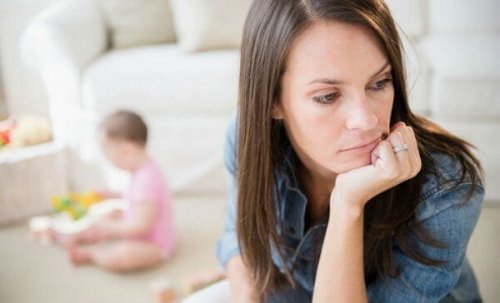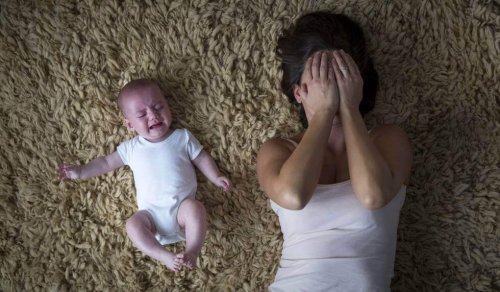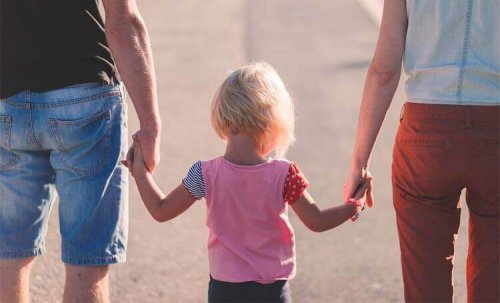Post-Adoption Depression: A Misunderstood Issue

Post-adoption depression is a common response to all the changes that stem from an adoption. New experiences, plus not knowing some of the adopted child’s needs, sometimes make the adoptive parents feel overwhelmed.
Adoption is a challenge that comes with physical and emotional stress. Some people need a lot of help when they adopt a child.
The arrival of a new child makes most parents feel joyful, happy, and even euphoric. However, some parents may feel sad or frustrated after their biological child is born or after they adopt a child.
Post-adoption depression is a risk
Unlike post-adoption depression, post-partum depression usually manifests after a complication-free pregnancy. In fact, this is a topic that’s been openly discussed by mothers and professionals in the medical and psychological field.

Between 50 and 80% of women who give birth may suffer from mild post-partum depression, while 10% of women may suffer from more severe post-partum depression. The cause of this condition seems to be hormonal changes.
However, post-adoption depression is not so accepted or understood, although many parents suffer from it.
When there’s no understanding or support
Adoptive parents start connecting and bonding with their adopted child between 2 and 6 months after the adoption. During those difficult months before they start to bond, new adoptive mothers don’t usually ask for help. They fear that people are going to think they’re not ready to be a mother.
This explains why many new adoptive mothers are afraid to tell people, especially psychologists and social workers, how difficult it’s been for them to adapt to their new life. They think that if they raise their voice and speak their minds, people will doubt their abilities to take care of the adopted child.
There’s no doubt that going through post-adoption depression is difficult. However, it can get even more complicated because biological parents tend to have more support and understanding from their social circle than adoptive parents.

The adoptive mother’s relatives may not understand why she doesn’t feel utterly happy now that she finally got what she wanted. She’s finally holding her child in her arms, so why isn’t she excited?
Consequently, adoptive parents who go through post-adoptive depression suffer in silence and feel ashamed. They don’t want to disappoint their families. In fact, they often ask themselves the same questions their relatives can ask of them. When they can’t seem to find a response to those questions, they feel irresponsible and guilty.
Causes of post-adoption depression
What lies behind the high percentage of parents who suffer from post-adoption depression? Most adoptive parents spend years trying to have a child, a human being they can take care of for the rest of their lives. Thus, their hopes, dreams, and desires can lead to unrealistic expectations about what it’ll be like to be parents.
First-time parents may feel guilty for their ambivalent emotions. On one hand, they love their new child, but on the other, they may feel resentful or angry if the situation doesn’t meet their expectations.
It’s unrealistic to believe that the parents are going to establish a bond with their adopted child immediately. Falling in love with an adopted child is like falling in love with a partner. The initial passion and euphoria slowly but surely fade away. Then comes the slow and difficult process of adjusting to a new human being and their daily presence.

How to deal with post-adoption depression
It won’t always be easy to adapt to the changes that stem from adopting a child. However, there are a few things that can help:
- Make sure you have enough free time to spend with your new child.
- Don’t feel guilty for not wanting any visits. However, you should accept the help that you need. Needing help doesn’t mean you’re a bad mother or father. It’s important to realize that it’s way more difficult to do everything by yourself.
- Try to extend your maternity leave as much as you can.
- Get enough sleep and exercise. It’s been proven that physical exercise improves our mood.
- Take your child for a walk so you can spend time together, have fun, and strengthen your bond.
- Don’t be afraid of sharing your feelings. Turn to adoption forums or adoption groups for help.
- Find people with similar experiences and let them help you.
- Ask your family and friends to understand you and respect your new decisions. Tell them that you have their own criteria and that you’re the one who has the last word when it comes to your child.
- Spend time with your partner, if you have one. If you have more children, don’t neglect them and spend time with them as well.
- Accept your faults and don’t be afraid to fail. At the end of the day, we’re all human. We’re not perfect, which means that it’s okay to make mistakes when it comes to parenting.
As you can see, post-adoption depression is a condition that, in many cases, feeds on a lack of understanding (both from the people who suffer from it as well as from their environment). Adoptive parents may be afraid that their new child won’t live up to their expectations, which can make them feel sad and hopeless.
If you find yourself in this situation, the best thing you can do is go to a specialist for help. Don’t hesitate to express yourself. Mental health professionals will understand your case and will help you in every way they can.
This text is provided for informational purposes only and does not replace consultation with a professional. If in doubt, consult your specialist.








